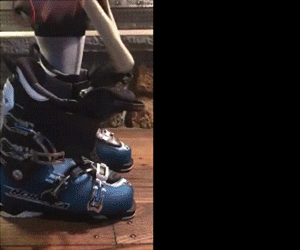Marigee
Angel Diva
@bobolinx - 56 is not too old - you are only as old as you feel! Wachusett is NSP affiliated, so the medical training will be their course "Outdoor Emergency Care" or OEC. At my home mountain the OEC portion of the training takes about 120 hours of class time. however, you have to include study time, practice time and travel time. All of that probably upped my training hours for OEC to around 200 hours, spread out over 8 months. Some mountains compress their OEC training into 4 months, during the fall. After you pass OEC, then most mountains conduct mountain specific "on the hill" training, which includes learning how to pull a toboggan over all the terrain (even through the bumps!) My training started at the end of April. We met on Friday nights from 6:30 - 9:30 until September. After Labor Day we met every Saturday from 8:00 - 4:00 at either my home mountain (Whitetail) or at our sister mountain (Liberty.) We took our written test in October and our practical in mid-December, on the snow. Most mountains conduct a ski-off in the spring to test skiing skills before they invite you to their class. Wachusett is in the EMARI region of the Eastern Division of the National Ski Patrol. https://emari.org/index.php/about/region-patrols
Here is the link to the Wachusett patrol application on the Wachusett web page: https://www.wachusett.com/TheMountain/OnTheSlopes/SkiPatrolSafety/tabid/92/Default.aspx
Here is a link to the Wachusett Ski Patrol web page: https://skipatrol.wachusett.com/
Every mountain is different regarding training, whether they fast track health care professionals, how strenuous the training is, etc. From their website it looks like at Wachusett you can be an "auxiliary "patroller. This means you can treat patients, but you can't transport them in a toboggan. to become a full "patroller" you would have to undertake their ski and toboggan (transportation) program. It also looks like Wachusett has a "Ranger" program which to me sound like the "Mountain Safety" program we have at Whitetail. Our Mountain Safeties help the patrol open and close the mountain, act as mountain ambassadors, educate the public on safety issues, keep the slopes safe, conduct accident investigations, etc. Mountain Safeties at my mountain do not perform medical care and do not transport patients. However, they are a very big help to the patrol. I was a Mountain safety for 4 years before I joined the Patrol. It is not required to be a Mountain Safety before joining the Patrol, but it can help during the ski-off becasue the Patrol knows you, your willingness to work, your skiing ability, etc. I don't know if the Ranger program at Wachusett works the same way.
Good luck, and feel free to PM me with any questions you have.
Here is the link to the Wachusett patrol application on the Wachusett web page: https://www.wachusett.com/TheMountain/OnTheSlopes/SkiPatrolSafety/tabid/92/Default.aspx
Here is a link to the Wachusett Ski Patrol web page: https://skipatrol.wachusett.com/
Every mountain is different regarding training, whether they fast track health care professionals, how strenuous the training is, etc. From their website it looks like at Wachusett you can be an "auxiliary "patroller. This means you can treat patients, but you can't transport them in a toboggan. to become a full "patroller" you would have to undertake their ski and toboggan (transportation) program. It also looks like Wachusett has a "Ranger" program which to me sound like the "Mountain Safety" program we have at Whitetail. Our Mountain Safeties help the patrol open and close the mountain, act as mountain ambassadors, educate the public on safety issues, keep the slopes safe, conduct accident investigations, etc. Mountain Safeties at my mountain do not perform medical care and do not transport patients. However, they are a very big help to the patrol. I was a Mountain safety for 4 years before I joined the Patrol. It is not required to be a Mountain Safety before joining the Patrol, but it can help during the ski-off becasue the Patrol knows you, your willingness to work, your skiing ability, etc. I don't know if the Ranger program at Wachusett works the same way.
Good luck, and feel free to PM me with any questions you have.
Last edited:

